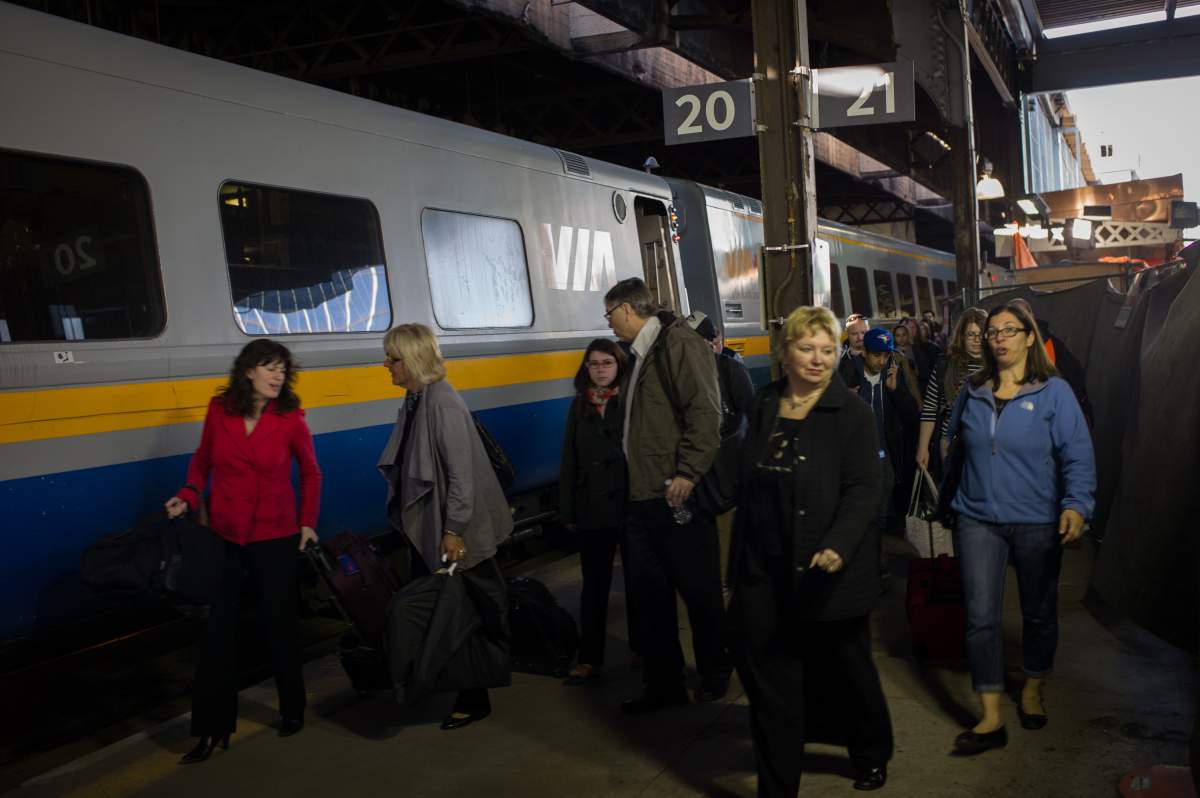Canadians relying on Via Rail to get home for the holidays may need to double-check what they’re packing in their wallet.

At the end of October, the passenger rail service started rolling out a new cashless policy on several routes.
That means travellers on the Quebec City-Windsor corridor, the Ocean, between Halifax and Montreal, and other regional trains can only buy food or beverages on board with a credit card.
Passengers were informed of the change during the ticket purchasing process, but as the holiday travel season starts to ramp up, it’s taken a number of customers by surprise. Many have taken to Twitter to air out their grievances.
Emily Plunkett is among them. Plunkett was travelling from Ottawa to Kingston on Nov. 16 when she encountered the new policy.
Plunkett says she rides Via Rail about once a year, typically between Ottawa and Sarnia to visit family during the holidays.
“My family is not comfortable driving to London in the winter to pick me up from the bus station and flying is more expensive and completely unreliable,” she said.
Plunkett settled in for her two-hour ride. But without a credit card, she had no means to pay for something to drink on board the train.
“They didn’t bother to give me a solution to my problem, but the passenger next to me offered to pay for my tea,” she said.
“The stewards happily admitted to me and the fellow sitting next to me that students were having problems with the change, as well.”

When she tweeted her concern to Via Rail, the company offered her a solution for future trips — purchase a gift card at the station prior to departure to use on board. If you don’t use it up by the end of your trip, and you have more than $5 left on the card, Via said, you can get cash-back at a station, so long as it’s staffed.
Plunkett wasn’t a fan.

Get breaking National news
“It’s already $250 to $300 to purchase a ticket… Now I’m shovelled with the burden of spending an extra $20 for a gift card I might not use in full?” she said.
“I even used the ATM before boarding assuming I would need it for the trip.”
According to Via Rail, the payment policy was changed to “optimize frontline operations.”
“This new on-board payment system will optimize frontline operations, all while streamlining out back-end food management systems,” said Via Rail spokesperson Karl-Philip Marchand Giguere.
“Eliminating cash will make Via Rail’s onboard transactions more efficient, allowing our employees to spend more time serving passengers.”
But Plunkett said she never carries a credit card because of debt issues.
She noted that some stations, like Sarnia, are often unmanned.
“Where are folks supposed to buy these gift cards for their journey? If they’re going straight through to Toronto, that’s potentially three hours without a stop for food.”
Consumers ultimately need choice, said Credit Counselling Canada CEO Michelle Pommells.
“Consumers need the ability to pay for services in cash should they wish to do so,” she said.

Pommells called the credit-only option “troubling” and called on Via Rail to reconsider the policy, which she suggested is ultimately limiting customers.
“It can be easy to get into debt, and much harder to get out of it. If you’re not in the habit of paying credit card balances in full each month, you’ll end up paying more than you bargained for a lunch snack or train ticket,” she said.
“Paying by cash also makes it easier to track exactly how you’re spending your money.”
While there have been a number of complaints about the change, studies show that a cashless economy is on the horizon.
According to Leger survey of 1,566 Canadian consumers, commissioned by payments company Square, an overwhelming 79 per cent consider themselves “card-first buyers.”
The same study found that 75 per cent of Canadians hadn’t visited an ATM or withdrawn cash within more than two weeks of being surveyed.
The Retail Council of Canada says only 15 per cent of retail consumers regularly paid with cash in 2018.
The Bank of Canada said in a report the same year that cash payments will continue to decline, but since the unbanked population is “very small” — 98 per cent of Canadians have a bank account — and electronic services are “near-universally” available, the disappearance of cash would likely not create material problems.
Many airlines, like WestJet and Air Canada, only accept cards on board.

Transport Canada, the Crown corporation that oversees Via Rail, says moving to a cashless system is an “operational decision within Via’s purview.”
“The government is sensitive to the situations some Canadians could be experiencing,” said spokesperson Annie Joannette.
“It is our understanding that Via Gift Cards can still be purchased with cash at a Via Rail ticket counter and that cash is still accepted on the Canadian and on the Churchill line.”
Via Rail says it remains “flexible” with cash purchases on the Senneterre-Jonquière and Sudbury-White River regional routes, but only temporarily. The new system will be phased in on those lines too.
The Canadian line (between Vancouver and Toronto), Winnipeg-Churchill and Jasper-Prince Rupert routes are still cash-only — “for now,” Via Rail’s spokesperson said.
“Via Rail understands that the transition period has an impact on its customers and is monitoring the situation closely to ensure a safe, easy, comfortable and enjoyable journey for all.”








Comments